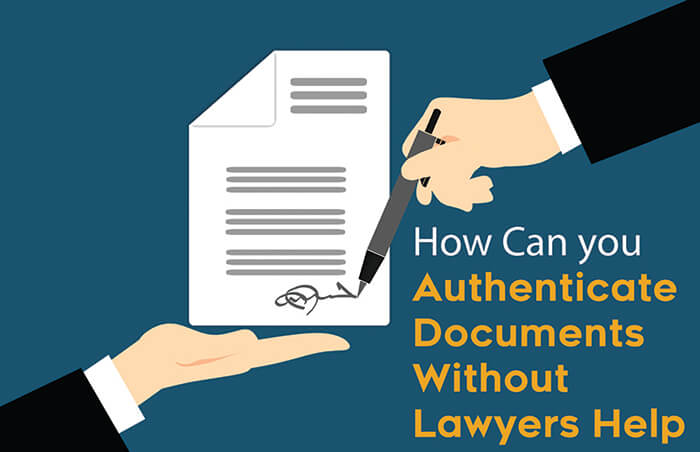How can you Authenticate Documents without Lawyers Help
 13-Apr-2022
13-Apr-2022- Introduction
- Buyers' checklist
- Verification of property papers
- Conclusion
How can you Authenticate Documents without Lawyers Help Due diligence and awareness of your rights can undoubtedly protect you from developers' unethical acts. In a sector where transparency is still lacking, despite the numerous legislations enacted over the last half-decade, it is best to physically inspect all documentation before purchasing any property. It is also strongly advised that you retain the services of a lawyer to guide you through this difficult process. If it is not a plausible circumstance, a buyer can finish the house purchase themselves by exercising extreme caution.
Related: Fraudulent rent receipt punishment: understand the ramifications of giving fake rent receipts.
Buyers' checklist
· Personal information
All of the seller's information must be enclosed in the contract. This includes information about the father's name, residence, PAN number, Aadhaar number, and bank account. The exact information about property location as well as municipal and tehsil records. The agreement should be witnessed by two people, one from the buyer's side and the other from the seller's side.
· Documents related to real estate
The seller must attest to the validity of the title documents and the agreement's ownership transfer. He must also say unequivocally that the transfer and handing over of possession is legal and thoroughly documented. The property taxes must be paid up till the date of transfer and this needs to be mentioned in the agreement. Furthermore, the agreement must completely cover the buyer in the event of a dispute over the property's title or possession.
· When did you get your possession?
For the purpose of transferring the flat from the builder, the date of ownership of a flat is relevant to the purchaser. It is the date on which the buyer will become the owner of the property, and it requires the developer to provide possession by the agreed-upon date. The purchaser has the right to litigate if possession is not provided by that date, a solicitor, and Company.
A contract's 'time of essence' clause establishes the contractual deadlines for the parties to fulfill their responsibilities.
· Schedule of payments
The payment schedule clause specifies the total amount to be paid as well as the time frame in which it must be paid. The payment schedule defines the details of each installment if the payment is done in installments. This helps to avoid any potential conflicts in the future. The agreement must include the buyer's complete payment information, including any mortgage information.
· Termination
The termination clause explains the charges that will be imposed on the parties if they do not comply to the required code of conduct. The contract may include a 'termination by convenience' clause, which allows either party to end the contract at any time.
· Resolution of disagreements
The procedure through which the parties can resolve their disagreements is outlined in the dispute resolution provision.
This is an alternative to taking the matter to court. Aside from that, adjudication and conciliation are two more ways to resolve commercial contracts.
· Amenities
The buyer is informed of the additional benefits to which he will be entitled, as well as the additional sum to be paid toward maintenance costs, by the amenities clause. The purchaser may consider any failure to deliver the requested amenities to be a violation of the contract.
· Penalty
A penalty provision should be included in the purchase agreement, clearly stating milestones and the consequences of both the seller and the buyer failing to meet them.
Finally, the buyer benefits from filing a valid purchase agreement because it protects them from legal issues at any stage of ownership or prospective selling. Once the purchase agreement has been created and registered, no changes can be made. If any changes are required, the buyer's assent must be acquired, and the agreement will be amended with an amendment
Read More Article
- How Can the Model Tenancy Act be a Blessing to NRIs?
- Everything You Need to Know about the Rent Agreement
Verification of property papers
Before agreeing to any deal, you must read and understand all of the terms and conditions, and clauses mentioned in the property documents. You may also find the working tough to understand due to the frequent use of legalese. Unless you examine a legal dictionary, don't presume a word has a definite meaning.
The encumbrance certificate, which is a legal document that confirms that the property is free of any mortgage or outstanding payment made to the bank or financial institute, is also a very important document. It also includes a list of the names of prior property owners.
When purchasing a resale property, request property tax receipts from the prior owner. This will show you whether or not the property has been properly registered.
Conclusion
The buyer benefits from registering and acquiring a copy of a valid purchase agreement since it protects them from legal issues. Keeping the above-mentioned elements in mind, the buyer can verify the legitimacy of the agreement papers. He or she should also be aware of the stipulations that must be included in the sale deed in order to obtain hassle-free ownership of the flat.
Related Article: 3 Important Things That You Must Not Forget While Giving Your Documents before Living in a Rented House



